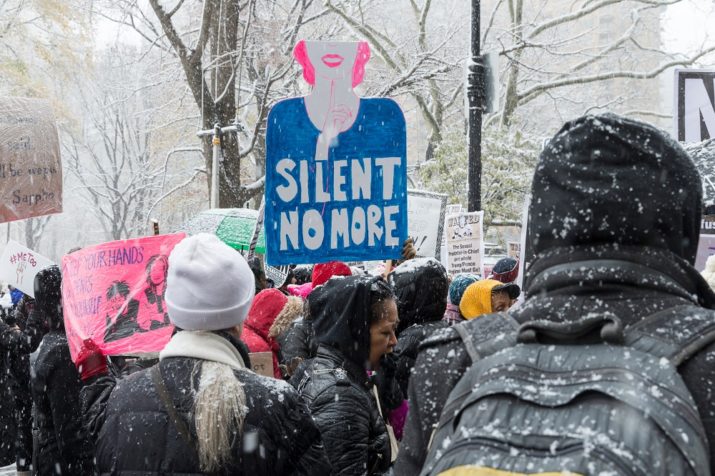

“My male brothers are having a hard time accepting the collapse of their virile empire, of which the planetary success of #MeToo is an undeniable sign of forewarning. They find it hard, I find it hard, we all find it hard to redefine our male ambitions, our male fantasies, our male behavior, and our male desire.” —Raphael Liogier
How to Write about #MeToo as a Man?
The phrase “me too” was coined in 2006 by the social activist Tarana Burke to empower women of color who had been victims of sexual abuse. The phrase then resurfaced in October 2017, during the sexual scandal surrounding Harvey Weinstein, when the actress and activist Alyssa Milano tweeted, “If all the women who have been harassed or assaulted wrote ‘me too’ as a status, we might give people a sense of the magnitude of the problem.” The next day, more than 55,000 women had replied #MeToo on their profile, and after only a week, 16 million had followed suit. However, despite its huge impact, the #MeToo movement has not yet received the theoretical attention it deserves. Instead, it has triggered a salvo of wild interpretations. It is read, at worst, as a witch-hunt on the part of women that is targeting “innocent rich men”; it is most often reduced to a series of scandalous revelations about exceptionally disgusting men, perverts, or narcissists, and not as a behavior generated by the very structure of masculinity. It is also sometimes presented as being limited to a movement only relevant to affluent white women; on other occasions, it has generated a call for a return to traditional gender norms such as the veiling of the of the female body. What has been avoided in all these cases is the general question of the banality of male evil and its relation to socially constructed notions of masculinity and virility. It is precisely this shameful connection that French sociologist and philosopher Raphael Liogier has used as a guiding thread in writing his new essay on the #MeToo movement, Descente au coeur du mâle.
Of course, to write on #MeToo as a man is not an easy task. Especially as a white European male who identifies as a “masculine” man, and who could thus easily be accused of using his “male” privilege to speak in the name of the victims. But Liogier has not fallen into this trap. On the contrary, he has risen to the occasion, writing one of the first personal essays in which a man talks very directly to other men about what it means to be a “virile” heterosexual man, and what it means to interact with women in this capacity. As such, his book could even be praised as the first essay authored by a man that actually takes into account the advice given by the feminist Hélène Cixous in her famous manifesto The Laugh of the Medusa: that men, just like women, should write for men and about men, and that it should target a new man to come.[3] In doing so, it might be possible for this new man to reflect on what it means to be a man, to reconsider his desires, his fantasies, his masculinity, his virility, in short, his potential malevolence. Liogier writes: “At the heart of it, the more I think about it, it is first and foremost to men that I am speaking. And for that matter, it is about them that I am essentially going to write. I speak to them man to man, starting from my own confusion.” (9)
Why Should Every Man Feel Concerned about #MeToo?
But what does the #MeToo movement mean when one approaches it from a male perspective? What male conflicts does it uncover? Does it concern only men who have been violent towards women, or does it concern every man, regardless of their personal conduct? For Liogier, the answer to this question is clear. Men do not have to feel guilty if they have not committed a crime. However, they do need to feel responsible, since the violence that underpins the sexual conduct reported by #MeToo has its roots in one of the most typical and commonly shared male fantasies: the fantasy of domination. To illustrate his idea, Liogier takes up the figure of Weinstein. But instead of using it as another excuse to make Weinstein into a sexual predator ready to do anything to satisfy his sexual needs (like the figure of the Primitive father in Freud’s Totem and Taboo or, more recently, the figure of Dominique Strauss-Kahn), Liogier analyzes the very fantasy that is at the root of Weinstein’s desire to sexually assault women—because this fantasy is not only one that involves his sexual satisfaction, but one that entails taking pleasure from dominating and humiliating women. In other words, what is essential in Weinstein’s case is not his unbridled sexual desire (which would turn him into an exception that could be used to make every other man feel better), but his desire to dominate women. And this desire is the problem. It is this desire that is at the core of the very notion of virility and masculinity, and in an inverted way, at the core of the male notion of femininity that has been supporting the structure of patriarchy for centuries.
To explore this notion of femininity, to position it as the flipside of the Weinstein version of masculinity, Liogier provides an original take on an early version of The Sleeping Beauty tale. In it, a woman is raped by her “prince” while sleeping. However, instead of awakening and instantly hating her aggressor, the sleeping beauty remains asleep while giving birth to many children. And once awake, thanks to her children, she falls in love (as a mother) with her aggressor. The message carried by the tale to a masculine and feminine audience is thus more than clear. A feminine woman only needs to remain silent and asleep (as long as she is not required by her duties as a mother) to be considered a good and desirable woman. A masculine man simply has to desire the immobile body of the sleeping beauty to be at once a good prince, a good lover, and a good father. In other words, while the prince’s fantasy of domination and his aggressiveness are seen as his natural “masculine” attributes, the impassivity of the sleeping beauty is seen as her natural “feminine” quality. There is thus, on the side of a man, the implicit injunction to rape without even considering the woman’s refusal (since, after all, the sleeping beauty is asleep, why bother asking?), and for a woman, there is the explicit injunction to accept whoever wants to take her, as long as her rape brings her children.[4]
Why Do Men So Desperately Feel the Need to Dominate?
The question then becomes: where does this very masculine desire for domination come from? To answer this new question, Liogier argues that, far from being the expression of the natural strength of men, this desire for domination is, quite on the contrary, the direct expression of the fundamental anxiety of men in front of the power of women. If men need to dominate women, it is not because they are stronger than women, but simply because men are afraid of women. And if men are afraid of women, it is because, as Françoise Héritier has shown, they are afraid of women’s sexual and reproductive power.[5]And it is out of this fear that men have built certain social structures in which they no longer have to face these fears, and in which they can structurally control these fears. This is why, in a patriarchal context, all the powers that originally belonged to women have been artificially reattributed to men. While women have the reproductive power, patriarchy granted to men alone the right to transmit their name to their children. While female sexuality is potentially unlimited, patriarchy managed to turn this limitlessness into a cause of shame and subordination.
Giving his thesis a psychoanalytical twist, Liogier argues, in a manner similar to that of Jacques Lacan and the feminist Luce Irigaray, that contrary to what Freud said about the castration complex, it is not the fear of being punished by the father that triggers the anxiety of castration but solely the anxiety of men facing their possible impotence.[6] Commenting on this idea, Liogier writes, “The anxiety of the female superpower, this frightening fantasy of the free woman’s superpower, it is the flipside of the masculine feeling of impotence. (…) Virility is the violent and fearful reaction to the male’s feeling of impotence (…). The ultimate nightmare for the male would be to be swallowed up by the desire of the woman” (88). Accordingly, what constitutes the heart of the male desire to dominate women is not only, as the first wave of feminism thought, a desire to limit women’s rights and economic independence but, as Simone de Beauvoir argued in The Second Sex, a desire to deny women their right to enjoy their body and their sexuality on their own terms.[7] To put it simply, the male fantasy of domination is primarily a denial of women’s autonomous will and, through this denial, a denial of women’s sexuality.
How Shall We Go Beyond the Male Anxiety that Fuels Sexual Violence?
In view of this specific problem, how should we understand the meaning of the #MeToo movement? To this ultimate question, Liogier answers by saying that #MeToo is actually the name of the end of man’s legal right to dominate women. It is the name that comes to historically mark the moment when men may no longer alleviate their sexual anxiety through the use of outdated patriarchal structures of power and gender inequality. This is why #MeToo is not only a major social movement, but also the sign of a historical turn that is affecting the very structure of our society. We are finally witnessing the fulfillment of Olympe de Gouges’s dream, that of granting to any human being, regardless of gender, the right to be considered a transcendental subject.[8] #MeToo names the fact that women, just like men, have an autonomous and indivisible will, prior and superior to any social conditioning, to any economic difference, to any ethnic or biological determination, and that this will needs to be finally recognized by men.
By using this recognition to move beyond the dialectic of domination upon which the social construction of masculinity and femininity rests, Liogier affirms, towards the end of his book, the transcendental values of consent as being a precondition to the trans-valuation of the very notions of masculinity and femininity.[9] Through this notion of “consent,” what is at stake for Liogier is not only, as one might think, an elevation of the notion of the contract as a way to subvert patriarchal norms (as it is the case with certain BDSM practices), but also a question of deconstructing gender norms through a critique of the logic of the fantasy that supports them.[10] In the conclusion of his book, Liogier writes, “Everything is a question of fluidity when it comes to fantasies and shared games. Nothing forbids playing the role of sexual dominator and, in return, the fragile subordinate, so long as the roles are not fixed or essentialized, destined to imprison genders in a hierarchical order; or making natural types of these roles. A possible slogan might be “to be different without feeling discriminated against.” To search for reciprocity. Which would allow us, following the Nietzschean expression, to trans-valuate the meaning of femininity as well as that of masculinity. And thus of the relation between them” (129).
In sum, the #MeToo movement is not only, for Liogier, the name of the end of men’s right to abuse women sexually and psychologically, but also the name of a very postmodern desire to invent new types of relationships between the sexes. And this desire, in order for it not to be reduced to a temporary and limited transgression trapped within the limits of a certain imaginary (like in BDSM practices), requires, as a prerequisite, the deconstruction of the male fantasy that supports the malevolence that lies at the core of the notion of virility. For it is only at this condition that it will become possible to construct new symbolic bonds that will, at the same time, subvert the imaginary limitations assigned to gender norms, and explore joyfully what Lacan, half a century ago, referred to as the absence of sexual relationships between the sexes.
Frederic Baitinger is a PhD candidate in the French Program at the The Graduate Center of City University of New York, where he is completing his dissertation, The Subject of Jouissance, under the direction of Professor Royal S. Brown. His areas of specialization include French literature and visual culture, with a focus on Avant-Garde literature and visual art, French theory, continental philosophy, postcolonial studies and critical race theory, and psychoanalysis. He is also an adjunct lecturer at Hunter College, a member of the International Association of Art Critics, and an active participant of the Lacanian Compass, an affiliate group of the New Lacanian School.
Click here for our special feature on Women, Gender, and Sexuality.
References:
[3] See. Cixous, Hélène. « The Laugh of the Medusa, » translated by Keith Cohen and Paula Cohen, Signs, Vol. 1, No. 4 (Summer, 1976), pp. 875-893. In this text, Cixous writes, “Men still have everything to say about their sexuality, and everything to write. For what they have said so far, for the most part, stems from the opposition activity/passivity, from the power relation between a fantasized obligatory virility meant to invade, to colonize, and the consequential phantasm of woman as a “dark continent” to penetrate and to “pacify.” (We know what “pacify” means in terms of scotomizing the other and misrecognizing the self.) Conquering her, they’ve made haste to depart from her borders, to get out of sight, out of body. The way man has of getting out of himself and into her whom he takes not for the other but for his own, deprives him, he knows, of his own bodily territory. One can understand how man, confusing himself with his penis and rushing in for the attack, might feel.” (877)
[4] I find it interesting to mention here that Botticelli’s painting La Primevera, first commissioned for a Medici wedding, represents exactly the same story. On the right of the painting is depicted the story of the nymph Cloris who was raped by Zephyr, before becoming his wife and the mother of his children.
[5] See, for more details on this question, Héritier, Françoise. Masculin/Féminin: La pensée de la différence, Odile Jacob, 1996.
[6] See, Lacan, Jacques, and Jacques-Alain Miller. Anxiety, 2017. Print. In this Seminar, Lacan reread Freud’s complex of castration by taking as its point of departure the functioning of the male organ, and the fear of detumescence that goes with it. Lacan argues that it is, for masculine man desiring women, this fear that activate the complex of castration, and not the fear to be punished by the father. See also, Irigaray, Luce. Speculum of the Other Woman. Ithaca, N.Y: Cornell University Press, 1992. Print.
[7] See, Beauvoir (de), Simone. The Second Sex. 2015. Print. In the third section of the first Volume called “Myth”, Beauvoir argues that women occupy, in relation to men, the mythical position of the inessential Other against which men can assert there fantasy of domination without risking to be challenged by this Other.
[8] Olympe de Gouges (1748-1793) was a French feminist and a political activist who wrote in 1791 the Declaration of the Rights of Woman and the Female Citizen. Through it, she challenged the male-female inequality that remained at the heart of the French revolution (since women were not granted the same right as men). She was guillotined during the reign of Terror for her feminist activism.
[9] Liogier uses the verb Trans-valuate in a Nietzschean sense, which means as a way to re-estimate the value assign to the notions of masculinity and femininity on a basis differing from accepted standards. To trans-valuate gender is thus not exactly the same thing as to deconstruct or to undo them. Although, in both cases, the goal remains the same: to escape the false alternative between a sadistic masculinity, and a masochist femininity.
[10] For certain queer scholars inspired by the work of Michel Foucault or Deleuze on masochism, the logic of the BDSM contract is seen, indeed, as a powerful tool to subvert gender norm. See, for example, Deleuze, Gilles. Sacher-masoch: an Interpretation. London: Faber, 1971. Print. See also, Halperin, David M, and Didier Eribon. Saint Foucault, 2000. Print. For a different stand on the possibility of subverting gender norms, closer to Liogier’s position, see, Butler, Judith. Gender Trouble: Feminism and the Subversion of Identity. New York: Routledge, 1990. Print. And Butler, Judith. Undoing Gender. New York, Routledge, 2009. Print. In both books, Judith Butler deconstruct the categories of gender upon which identity politics is resting in order to think differently the notion of sexual identity.
All the quotes in English are Chris Clark and Frederick Baitinger’s translations of Descent into the Male Heart: What the #MeToo Movement Says About Us (Descente au Cœur du Mâle: De quoi #MeToo est-il le nom?) by Raphaël Liogier
Photo: New York, NY #MeToo rally drew dozens of protesters to the Trump International Hotel at Columbus Circle | Shutterstock
Published on February 5, 2019.




